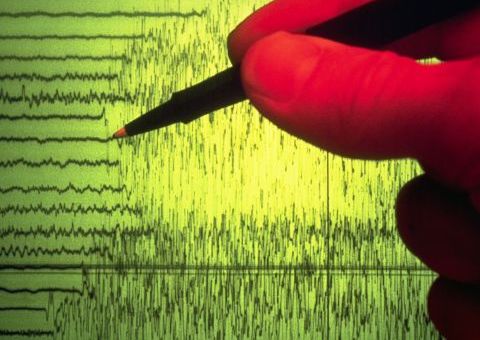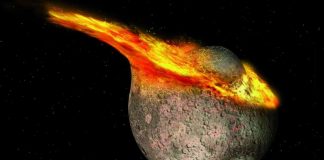Earthquake warning affects Ventura, Los Angeles, San Diego, San Bernardino, Riverside, Orange, Kern and Imperial counties, and residents there are advised to stock up on food and water in case of an emergency.
CALIFORNIA may be about to be hit by a massive magnitude 7 earthquake after geologists discovered a succession of smaller tremors under a lake near the San Andreas fault.
“Any time there is significant seismic activity in the vicinity of the San Andreas fault, we seismologists get nervous,” said Thomas Jordan, director of the Southern California Earthquake Centre. “We recognise that the probability of having a large earthquake goes up.”
The news comes after more than 140 smaller quakes rippled under the Salton Sea, a lake situated north of San Diego.
The lake is located in the Brawley Seismic Zone, one of the most prolific sources of earthquakes in the state, according to the US Geological Survey seismologist Lucy Jones, and is worryingly close to the 800-mile long San Andreas fault.
Preliminary USGS data showed that there was a roughly one per cent chance of a quake of magnitude seven or greater hitting the Southern San Andreas fault within the next week. Such a natural disaster could kill 1,800 people and cost $200bn according to a USGS 2008 simulation.
The likelihood of this event, however, decreases as each day passes.
The tremors, three to seven miles beneath the Salton Sea, started around 4am Monday morning and continued for more than 24 hours.
Three quakes in the swarm measured above a magnitude of four.
It is only the third time such a swarm has happened in the area since sensors were installed in 1932.
The swarm of quakes raised concern as the lake is just south of where the San Andreas fault ends, and the surrounding network of faults could trigger it to wake up for the first time since 1680.
The last time the Salton Sea quakes had strong repercussions was in 1987 when the 5.9 magnitude Whittier Narrows earthquake struck the San Gabriel Valley.
Here’s what you can do to be prepared
- Look around places where you spend time. Identify safe places such as under a sturdy piece of furniture or against an interior wall in your home, office or school so that when the shaking starts, you Drop to the ground, Cover your head and neck with your arms, and if a safer place is nearby, crawl to it and Hold On.
- Practice how to “Drop, Cover, and Hold On!”
- To react quickly you must practice often. You may only have seconds to protect yourself in an earthquake.
- Before an earthquake occurs, secure items that could fall and cause injuries (e.g., bookshelves, mirrors, light fixtures).
- Store critical supplies (e.g., water, medication) and documents.
- Plan how you will communicate with family members, including multiple methods by making a family emergency communication plan.
- When choosing your home or business, check if the building is earthquake resistant per local building codes.
Maxine J. Martin














I’m sure nothing significant will happen at that fault for a thousand years, meanwhile we will get hit with 500 other natural disasters we didn’t see coming.
Quit pretending you can predict this stuff. I’m tired of reading sensationalist headlines.
Pseudo-science dorks sitting behind a computer screen trying to alarm people. /shrug